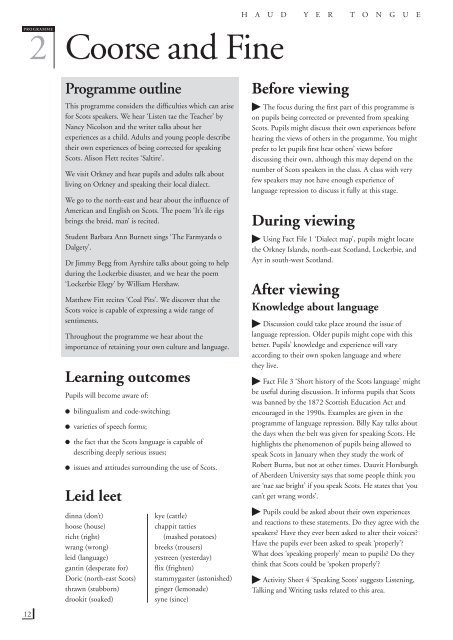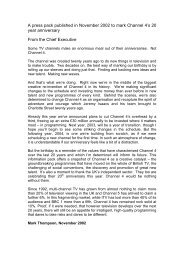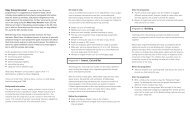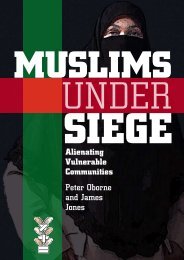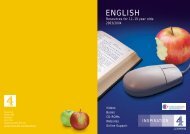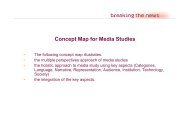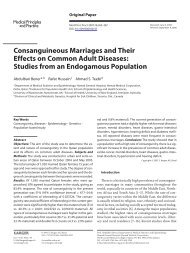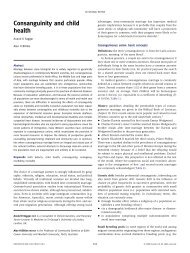Create successful ePaper yourself
Turn your PDF publications into a flip-book with our unique Google optimized e-Paper software.
PROGRAMME<br />
2<br />
12<br />
Coorse and Fine<br />
Programme outline<br />
This programme considers the difficulties which can arise<br />
for Scots speakers. We hear ‘Listen tae the Teacher’ by<br />
Nancy Nicolson and the writer talks about her<br />
experiences as a child. Adults and young people describe<br />
their own experiences of being corrected for speaking<br />
Scots. Alison Flett recites ‘Saltire’.<br />
We visit Orkney and hear pupils and adults talk about<br />
living on Orkney and speaking their local dialect.<br />
We go to the north-east and hear about the influence of<br />
American and English on Scots. The poem ‘It’s ile rigs<br />
brings the breid, man’ is recited.<br />
Student Barbara Ann Burnett sings ‘The Farmyards o<br />
Dalgety’.<br />
Dr Jimmy Begg from Ayrshire talks about going to help<br />
during the Lockerbie disaster, and we hear the poem<br />
‘Lockerbie Elegy’ by William Hershaw.<br />
Matthew Fitt recites ‘Coal Pits’. We discover that the<br />
Scots voice is capable of expressing a wide range of<br />
sentiments.<br />
Throughout the programme we hear about the<br />
importance of retaining your own culture and language.<br />
Learning outcomes<br />
Pupils will become aware of:<br />
● bilingualism and code-switching;<br />
● varieties of speech forms;<br />
● the fact that the Scots language is capable of<br />
describing deeply serious issues;<br />
● issues and attitudes surrounding the use of Scots.<br />
Leid leet<br />
dinna (don’t)<br />
hoose (house)<br />
richt (right)<br />
wrang (wrong)<br />
leid (language)<br />
gantin (desperate for)<br />
Doric (north-east Scots)<br />
thrawn (stubborn)<br />
drookit (soaked)<br />
kye (cattle)<br />
chappit tatties<br />
(mashed potatoes)<br />
breeks (trousers)<br />
yestreen (yesterday)<br />
flix (frighten)<br />
stammygaster (astonished)<br />
ginger (lemonade)<br />
syne (since)<br />
H A U D Y E R T O N G U E<br />
Before viewing<br />
The focus during the first part of this programme is<br />
on pupils being corrected or prevented from speaking<br />
Scots. Pupils might discuss their own experiences before<br />
hearing the views of others in the progamme. You might<br />
prefer to let pupils first hear others’ views before<br />
discussing their own, although this may depend on the<br />
number of Scots speakers in the class. A class with very<br />
few speakers may not have enough experience of<br />
language repression to discuss it fully at this stage.<br />
During viewing<br />
Using Fact File 1 ‘Dialect map’, pupils might locate<br />
the Orkney Islands, north-east Scotland, Lockerbie, and<br />
Ayr in south-west Scotland.<br />
After viewing<br />
Knowledge about language<br />
Discussion could take place around the issue of<br />
language repression. Older pupils might cope with this<br />
better. Pupils’ knowledge and experience will vary<br />
according to their own spoken language and where<br />
they live.<br />
Fact File 3 ‘Short history of the Scots language’ might<br />
be useful during discussion. It informs pupils that Scots<br />
was banned by the 1872 Scottish Education Act and<br />
encouraged in the 1990s. Examples are given in the<br />
programme of language repression. Billy Kay talks about<br />
the days when the belt was given for speaking Scots. He<br />
highlights the phenomenon of pupils being allowed to<br />
speak Scots in January when they study the work of<br />
Robert Burns, but not at other times. Dauvit Horsburgh<br />
of Aberdeen University says that some people think you<br />
are ‘nae sae bright’ if you speak Scots. He states that ‘you<br />
can’t get wrang words’.<br />
Pupils could be asked about their own experiences<br />
and reactions to these statements. Do they agree with the<br />
speakers? Have they ever been asked to alter their voices?<br />
Have the pupils ever been asked to speak ‘properly’?<br />
What does ‘speaking properly’ mean to pupils? Do they<br />
think that Scots could be ‘spoken properly’?<br />
Activity Sheet 4 ‘Speaking Scots’ suggests Listening,<br />
Talking and Writing tasks related to this area.


